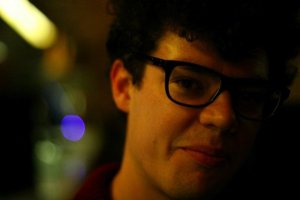Aden Rolfe
Thursday 29th April, from 1pm-3pm
Bon Marche Studio (UTS Bldg. 3, Lvl. 1, Rm. 105)
Presentation, 20 mins.
‘We were walking into an area that wanted to disguise its true identity, deflect attention from its hot core.’
Iain Sinclair, London Orbital, p56, Granta Books, London 2002
A psychogeographical iPhone app is simple to envisage. As a build on a basic map program that utilises the GPS in the phone, a number of options for lateral cartography emerge. First and most obviously, the ability to plot dérives using actual maps, and uploading a variety of information to instruct or record these drifts – photos, sketches, scribblings. Another function would be to overlay maps of other cities or suburbs on your location, a favoured technique of the Situationists. Where the app extends this practice is by allowing one to follow and record their progress through the superimposed territory, using GPS, as well as the actual territory. If wandering by chance, the GPS can record one’s route without the walker needing to do so. Removing oneself from this process in the present creates a self more reactive to the environment than reflective on the passage.
Thus, such an application could facilitate the rediscovery of unfamiliarity within places one knows well, or as an alternative way to initially discover new cities, suburbs, streets, districts. But this is secondary to such an application’s more interesting possibilities: the recording of local histories, mythologies and social geographies.
A writer such as Sinclair is revelatory in his links between social history and psychogeography. Place yields story after fact after rumour, providing endless avenues for exploring the hidden and forgotten tales that are embedded in the terrain. His limitation, when received outside of London, is the reader’s limitation. Characters, places, landmarks are less familiar or entirely strange, the links weaker, the exposures less poignant. Australia could use a Sinclair of its own. In lieu of, or perhaps better than, such a person, an interactive psychogeographical program, allowing users to upload information linked to place, news stories pinpointed to coordinates, could open up the urban landscape to the kind of engagement and narrative-gathering that Sinclair propounds.
This would be a visual presentation of the hypothetical application, requiring a digital or overhead projector. It would fall on the longer side of 10-15min or shorter side of 20-30min, schedule permitting. In style, it would be somewhere between a software presentation and a poetics of local history, tying in some of the social histories we already have, such as Paul Carter’s Road to Botany Bay and the mini-series Blue Murder.
Aden Rolfe is a Melbourne-based writer, curator and radiomaker whose work includes poetry, collage and cultural studies. His writing has appeared in Overland, Cutwater and Best Australian Poetry 2009, and he was commended for the Judith Wright Poetry Prize, 2009. He has had radioplays and sound collages broadcast on ABC Radio National, and formerly wrote for theatre and webcomics. Aden is currently Co-Director of the Critical Animals Creative Research Symposium.


And then, there is stumbling, forgetting, not-knowing and the embrace of one’s own disorientation, all of which heighten observation and the pleasures found within psychogeography (and do not rely upon plotting, recording or the map).